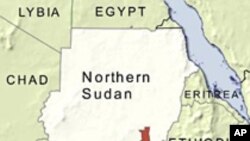<!-- IMAGE -->
A parliamentary boycott and the ongoing dispute over the southern independence referendum highlight the fragile nature of North and South Sudan's peace agreement as it enters its critical final phase. Analysts worry that time is running out for the two sides to resolve their differences over the deal.
The Comprehensive Peace Agreement signed in 2005 between the North and South put an end to a civil war that had left nearly two million dead since 1983.
The deal incorporated the South's rebel Sudan Peoples' Liberation Movement into the national government and gave southern Sudan a semi-autonomous government. A wealth-sharing portion of the agreement also gives the South a 50-percent cut of all the oil revenue generated from the oil fields within its territory, where most of Sudan's oil supplies lie.
But the document, which some analysts argue is better described as a conditional "ceasefire" than an actual peace agreement, is mostly silent on the details as to what happens after January 2011, when a southern independence referendum is to give the South the option to split from the North.
The six years given to prepare for the referendum have now whittled down to just 14 months. National elections, which were to give Sudan a chance to see what a democratic and united Sudan could look like, have been twice postponed and are now scheduled for April 2010.
Fouad Hikmat, a Sudanese analyst for the International Crisis Group, says that realistically the two sides must come to terms with each other on a number of remaining issues before the end of the year for real national elections to take place.
He says that if the elections fail to occur in a manner acceptable to all parties, the possibility of a peaceful referendum process becomes much more unlikely.
"If this parliament does not do anything, very clearly the elections are going to have a serious problem, and therefore the referendum [as well]," said Hikmat.
In a move to pressure the North's ruling National Congress Party, the SPLM parliamentary bloc has walked out of parliament indefinitely, depriving the national government of a legislative majority. Some northern opposition parties have followed suit.
At immediate issue are a number of reforms SPLM and the northern opposition demand be enacted in order to limit the power of the NCP to squelch freedom of speech and to limit political liberties during the lead-up to the elections.
But most critical to the South is the continuing rift with Khartoum over the details of its prized option to secede.
Rabi Abdulaati, a senior communication official for NCP, says that he is confident that the remaining issues will be resolved.
"The National Congress Party is ready to discuss the point of differences between the two parties," said Abdulaati. "I do not think that there will be any problem in the discussions and negotiations until they reach one accord," said And, after that, the SPLM and the National Congress Party have the majority in the national assembly."
Resolution between the two sides remains elusive, as deep distrust forged by decades of war constrains the relationship between the now-government partners. A week ago South Sudanese Vice President Riek Machar announced a breakthrough deal with the NCP on the matter of the referendum. The South could secede on the basis of a simple majority, but the vote would require a two-thirds quorum in order for the exercise to count.
The move quickly came under fire from other southerners, who noted that a two-thirds turnout would likely be a tall order for such an undeveloped region. On Sunday, SPLM secretary general Pagan Amum announced the South had rejected the deal struck by its negotiator.
The disagreement over the national-census results also remains contentious. The SPLM rejects the official tally, which is to determine regional voting power during the elections. Border disputes between the two sides also continue to fester.
Hikmat says that these next few months could determine the future of the nation.
"This is the most critical conjuncture of the relationship between the two parties," he said. "This is the moment where they really need to come together to start carefully working out their disagreements so that they agree on the pending issues if the two benchmarks are going to happen, the elections and the referendum."
For all the issues that must be urgently resolved, the two struggling Sudanese partners are being urged to immediately begin negotiations on a post-2011 Sudan. The U.N. secretary general's update report on the mission in Sudan warned that "long-term peace and stability will not be possible without an agreement on the post-referendum arrangements."
According to Hikmat, the two sides have no choice but to resolve their issues. The alternative is a return to civil war, a scenario welcoming to neither side.
